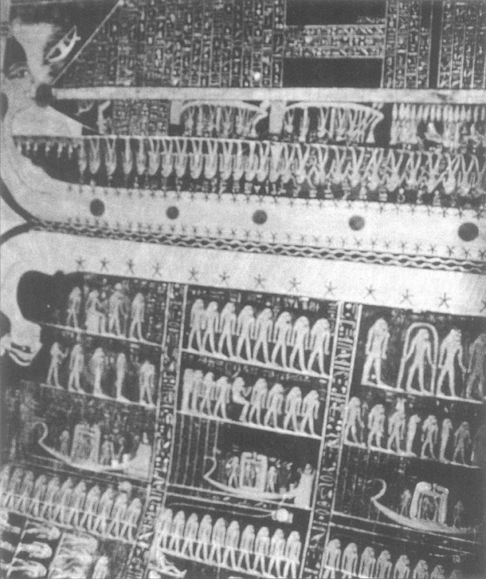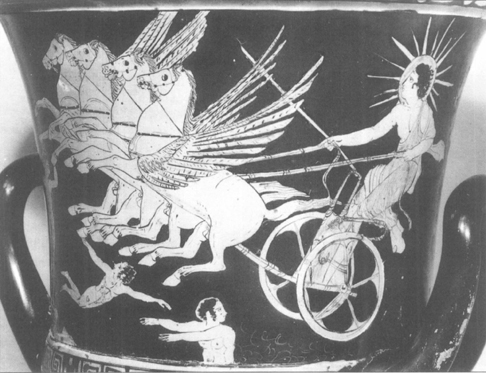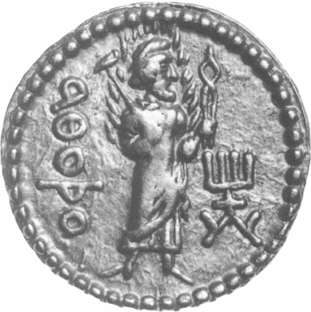THE TIGER ON THE HEARTH
Half a million years ago, a small tribe of primitive creatures not quite human, but almost huddle inside their cave. Outside lie darkness and the damp chill of a rainy autumn night Outside wait the teeth and claws of night-hunting beasts. But between the tribe and the fears and dangers of the dark is an amazing, magical guardian: a hot, bright fire.
I n those days before people were people, what did early humanoids think as they watched the yellow flames dance, as they felt their faces glow in the warmth? They knew how to keep a fire going; they used it to harden the tips of their wooden hunting spears, and to cook the meat the hunters brought home. Yet what was it? Where did it come from? And when it went out, where did it go?
Keep your distance, treat it with respect, and fire would do wonderful things for you. Get a little too close, or the least bit careless, and it could sear you with terrible pain, and mark you for life perhaps even for death.
And sometimes why? a great fury of fire would sweep across the land, gobbling up trees and grass, and animals, and anyone it could catch, leaving nothing behind but stinking black ruin.

 In the past, many people reassured themselves with stories about where the sun went at night. One Egyptian myth said it was swallowed by Nut, the sky goddess, each night, and reborn from her each morning. This ceiling painting shows the sun moving through Nuts body, hour by hour.
In the past, many people reassured themselves with stories about where the sun went at night. One Egyptian myth said it was swallowed by Nut, the sky goddess, each night, and reborn from her each morning. This ceiling painting shows the sun moving through Nuts body, hour by hour.

 Helios, a sun god in classical Greece, drove his chariot and four fiery horses across the sky each day. Many early cultures believed that fire was a gift from the gods. The Greeks said that Prometheus stole it from Mount Olympus, the home of the gods, and gave it to man, and that he was brutally punished by Zeus, the king of the gods, for daring to give away such a precious treasure. ()
Helios, a sun god in classical Greece, drove his chariot and four fiery horses across the sky each day. Many early cultures believed that fire was a gift from the gods. The Greeks said that Prometheus stole it from Mount Olympus, the home of the gods, and gave it to man, and that he was brutally punished by Zeus, the king of the gods, for daring to give away such a precious treasure. ()
What was this ageless, bodiless being that came from nowhere and disappeared into nowhere? What kind of creature or spirit would slumber so tamely on your cooking-hearth, yet turn on you savagely, with no warning, for no reason?
Worshipping fire
We call those early humanlike creatures Homo erectus, because they stood erect on two legs, as we do. They evolved into our own species, Homo sapiens thinking people, as we have proudly named ourselves. Over the centuries, we have certainly spent a lot of time thinking about fire.

 On an ancient coin, Atsho, one version of the Persian fire god, carries tongs and a hammer, to light a fire and keep it going. In the Persian religion of Zoroastrianism, fire is the son of the great god Ahura Mazda, representing the gods eternal light. In the Western world, some war memorials house a small fire an eternal flame symbolizing everlasting life for soldiers who have died for their country. ()
On an ancient coin, Atsho, one version of the Persian fire god, carries tongs and a hammer, to light a fire and keep it going. In the Persian religion of Zoroastrianism, fire is the son of the great god Ahura Mazda, representing the gods eternal light. In the Western world, some war memorials house a small fire an eternal flame symbolizing everlasting life for soldiers who have died for their country. ()
Early civilizations wondered about the glowing disc that rose in the eastern sky each morning, bringing warmth and light and security to the whole land. Was the sun something like the humble cooking fire, which brought those same comforts to a family? Would the sun burn you like a fire if you got too close? Could it worse yet some day go out, the way cooking fires sometimes did, leaving you in the cold and the dark forever?
People also wondered about the warmth they felt in their own bodies, and in so many animals. Where did it come from, and why did it eventually go out, just like a fire? What was the connection?










 Dave Albright holds a cat rescued from a fire in a fifth-floor apartment. Even today, when emergency services cant always roll out to rescue pets, a lot of animals still owe their lives to the fire department. They get rescued, they get oxygen, and sometimes CPR is administered to a small, furry chest. ()
Dave Albright holds a cat rescued from a fire in a fifth-floor apartment. Even today, when emergency services cant always roll out to rescue pets, a lot of animals still owe their lives to the fire department. They get rescued, they get oxygen, and sometimes CPR is administered to a small, furry chest. ()


